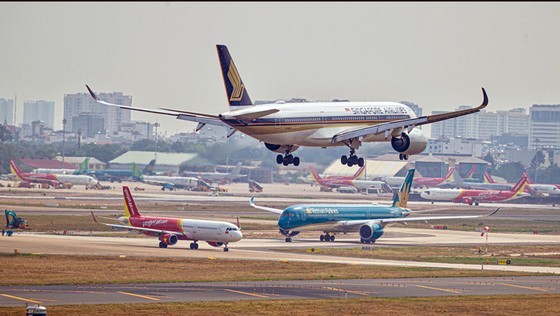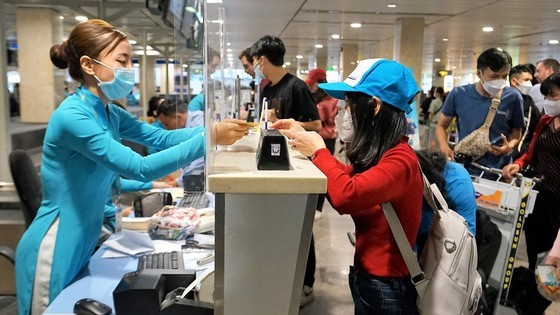 |
Tan Son Nhat Airport. (Photo: SGGP) |
Suffering losses despite a high number of passengers
On the occasion of the Lunar New Year, major airports in the country welcomed a record number of passengers. Tan Son Nhat Airport alone received more than 3 million passengers, an increase of nearly 20 percent compared to the same period in 2019. Airfares continuously fluctuated accordingly, and the situation of online booking sites encountering network congestion and tickets being sold out happened during the Tet holiday. Nguyen Quan, from Tuyen Quang Province, temporarily residing in District 3, HCMC, said that his family booked flight tickets to return home nearly 20 days before the Lunar New Year, but it was difficult to buy them. "Ticket agents and online ticketing sites announced that all tickets were sold out, forcing buyers to choose business class tickets or connecting flights. Passengers even had to fly to Bangkok (Thailand) to be able to fly to Hanoi," Quan said frustratingly.
Despite a large number of passengers, airlines still reported losses. Vietnam Airlines' financial report for the fourth quarter of 2022 shows that the national flag carrier achieved consolidated revenue of nearly VND71 trillion. Of which, revenue from transportation activities was more than VND51.46 trillion. This figure is larger than the sum of 2020 and 2021 and is equivalent to 70 percent of pre-Covid-19 revenue. However, Vietnam Airlines still reported a loss of more than VND10 trillion and accumulated losses of over VND34 trillion by the end of 2022, causing its equity to be negative by more than VND10 trillion and debt to be over VND70.77 trillion.
Similarly, 2022 is considered a year of strong recovery for Vietjet Airlines. Accordingly, the airline transported 20.5 million passengers with 116,000 flights. Of these, domestic passenger transport grew by 20 percent compared to 2019. Particularly, international passenger transport continued to record positive signals as the airline opened more than 20 new routes in 2022, focusing mainly on the Indian market, connecting economic and tourist centers, including New Delhi, Mumbai, Hanoi, and HCMC. By December 31, 2022, Vietjet had operated a total of 103 routes. However, Vietjet's consolidated financial statements for 2022 show a gross loss of nearly VND2.17 trillion and debts of roughly VND55.51 trillion.
Besides, Bamboo Airways and Vietravel Airlines are not better as they cannot cover the total operating costs.
Restructuring
Airlines explained that first, the Covid-19 pandemic had disrupted global supply chains. The flight suspension was prolonged, but airlines were forced to maintain their apparatus. Next, conflicts nationwide led to a spike in fuel prices and high interest rates. For example, jet fuel price was only US$72 per barrel in 2021, but it climbed to about $130 per barrel. Jet A1 gasoline price sometimes surpassed $160 per barrel. Besides, there was the impact of the US dollar exchange rate. According to a representative of Vietnam Airlines, most of the flight charter contracts are paid in US dollars, while the currencies of countries where Vietnam Airlines has flight routes, such as Japan, South Korea, and Europe, are depreciated sharply.
To find solutions to overcome difficulties, Vietnam Airlines representative said that it had submitted to the competent authorities a project to restructure the corporation in the period 2021-2025, which proposed synchronous implementation of solutions to overcome the situation of consolidated loss and negative equity, for instance, restructuring assets and financial investment portfolios, and preparing necessary conditions to implement the plan to issue shares to increase owner’s equity.
 |
Passengers check in at Vietnam Airlines' ticket counter. (Photo: SGGP) |
Ms. Ho Ngoc Yen Phuong, Vice President of Vietjet, also informed that the airline purchased a new A321 NEO aircraft from Airbus and two A321 aircraft from aircraft leasing partners to serve passengers better. Especially, in 2023, Vietjet aims to achieve high revenue growth thanks to the opening of the Chinese market and promote the exploitation of potential international markets, including India, South Korea, Japan, and Australia. “It is crucial that the government considers removing the price ceiling and allowing gasoline surcharges to help strengthen internal strength and competitive edge for domestic airlines in the context that the presence of international airlines with destinations in Vietnam is expected to increase sharply in 2023," suggested Ms. Ho Ngoc Yen Phuong.
From a tourism perspective, according to Mr. Tran Thanh Vu, General Director of Vinagroup Travel, countries around the world are closely combining aviation and tourism. Once the world fully reopens, the tourism industry is expected to boom, creating opportunities for the aviation industry to recover. Taking Thailand as an example, Mr. Tran Thanh Vu said that the Thai government had approved the Tourism Authority of Thailand's revenue target of about $65 billion and related strategies for 2023 to revive the tourism industry. Thai airlines are also making efforts to connect and bring customers from countries in the region and around the world to Thailand, offering many preferential policies for large tour groups. This has created competitive tour prices and attracted more tourists, benefiting the aviation industry as well.
Sharing the same point of view, many aviation service companies in HCMC are busy scheduling meetings with Chinese airlines to find partners and promote travel and tourism between the two countries. From March 2023 onwards, it is expected that two-way flights between Vietnam and China will be more bustling. Vietnam Airlines plans to resume five flight routes between Vietnam and China from March and April, namely Hanoi - Beijing, with a frequency of three flights per week, and increase the frequency of flights connecting Hanoi and HCMC with Guangzhou and Shanghai. For each route, Vietnam Airlines will have four flights per week.
* Mr. Nguyen Hoang Dung, Former Director of Research and Development, Institute of Economics and Management HCMC: Strengthening internal governance to serve better
Airlines need to have a sustainable and viable business strategy after the Covid-19 pandemic to replace short-term profit contracts, especially with reliable statistics to make the basis for making appropriate policies. Currently, many statistical figures are only for show. For example, the recent statistics of the tourism industry, in which each locality announced different numbers of tourists and statistical methods. In addition, the aviation industry needs to strengthen internal management to serve passengers better to compete with other airlines around the world.
* Dr. Dinh The Hien, economic expert: Forecasting to proactively overcome difficulties
According to Dr. Dinh The Hien, cost-cutting management solutions, like in other manufacturing industries, do not have much impact. That is why many large airlines with strong potential have not yet found an effective solution to cut losses. Especially, it should be emphasized that forecasting is crucial. That is, instead of thinking about how to cut losses, it is necessary to forecast when the market will recover according to the set scenario. With forecasts corresponding to each recovery scenario, how much financial resources are needed to endure, from which businesses can arrange appropriate financial resources. These solutions are considered proactive for enterprises to withstand the temporary market recession.
Ms. Tran Anh Dao, Deputy Director of the HCMC Stock Exchange (HoSE), informed that the HoSE had sent a notice to Vietnam Airlines (stock code HVN) regarding the possibility of delisting the company's stock due to its continuous losses. According to securities regulations, the stocks of a public company can be delisted in case of three consecutive years of losses, accumulated losses exceeding charter capital, or negative equity in the most recent audited financial statements. The HoSE has warned Vietnam Airlines of the possibility of delisting its stock if the consolidated financial statements for 2022 continue to show post-tax losses and negative equity.
























